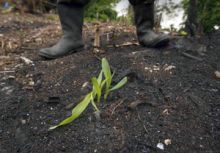This country was the other day shocked with the news that environmentalist Volodymyr Honcharenko was murdered in Dnipropetrovsk oblast.
It is difficult and even mortally dangerous to be an environmentalist in Ukraine. Protecting the environment and, accordingly, public health, you can “impair” somebody’s business, hurt somebody’s interests, cut down somebody’s superprofits, and finally pay for this with your own life. In the Ukrainian realities, any environmentalist has every chance to become the personal enemy of an influential person and his or her capitals. This applies not only to ecologists, but also to journalists and other active citizens who are trying to expose some blatant facts and put some important information across to society. I’ve been in this field since 1994, and I must say there have always been instances of intimidation and even physical violence with respect to ecologists. But, in the last while, these have become crueler and more aggressive. Suffice it to recall Kharkiv residents’ protests against the construction of a road across Gorky Park. Instead of settling the conflict with the public, it was decided to make short work of the people who defend their rights and protest,” Dmytro SKRYLNIKOV, environmentalist, chair of the civic organization Bureau of Ecological Investigations, says to The Day. According to the expert, the murder of the well-known environmentalist Volodymyr Honcharenko last week confirms again that ecology is today among the interests of the government, business, and criminal circles. “In my view, business, the authorities, and criminals are closely linked. People are running for parliament in order not to make laws but to protect their business and gain parliamentary immunity. The period of the ‘wild’ accumulation of capital is still on: the authorities, in cahoots with business, are trying to grab as many natural resources as possible, which has a direct impact on the ecological rights of people and, in some cases, leads to flagrant consequences,” Skrylnikov explains. In his words, only the least-protected people are usually brought to criminal justice for environmental offenses. “It is easier to ‘put inside’ a Carpathian peasant who has cut down a few trees to kindle fire in the stove than to bring to justice those who smuggle out truckloads of wood,” the environmentalist explains. For this reason, the victim’s colleagues strongly doubt that the guilty will be found and somebody will be held responsible for the environmental crimes that Honcharenko disclosed.
What could improve the situation is presence of the followers of the “green idea” in parliament. However, there is no really strong and influential green party in Ukraine today, and ecological activists have not been put on party election lists, even though civic ecological organizations made a noticeable contribution to the development of democratic movement as such in the 1990s. “Following the Chornobyl tragedy, Ukraine was one of the first to democratize its legislation, and it is the civic ecological organizations, which had emerged on the post-Chornobyl platform, that launched the most powerful democratic movement.







